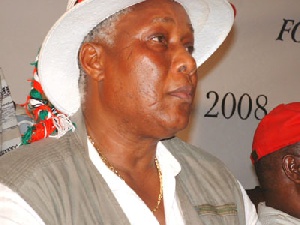Government has in the last four years secured a combination of loans and grants totaling 1.4 billion dollars to ensure that the supply gap of water and sanitation service was effectively managed within a planning horizon of year 2025.
Aside that amount, government also contributed an amount 6.4 million Ghana Cedis from the national purse for the same agenda.
Mr Enoch Teye Mensah, Caretaker Minister for Water resources, Works and Housing who was opening the 64th Annual New Year School and Conference in Accra on Monday, said the rural and small towns’ water and sanitation sub-sector had seen consistent progress in coverage levels with an increase from 40 per cent in 2000 to 63.34 per cent in 2011.
The week long school is being organized by the Institute of Continuing and Distance Education, University of Ghana on the theme, “Improved Water, Sanitation and Hygiene: The Key to Future Health of Our Nation”.
He said over the years, demands for water, especially in the urban areas, had outstripped supply as a result of obsolete water infrastructure; uncontrolled human settlement; encroachment on head-works leading to siltation and difficulty in expansion, and the vandalisation of water assets.
“Successive governments in our country have made efforts to improve water and sanitation service delivery in both urban and rural areas.
“In recent years, for example, a number of projects have been undertaken to improve the delivery of safe and affordable water to the urban areas,” the acting Minister said.
Mr Mensah announced that a committee had been set in his Ministry to oversee the implementation of further changes in the management of the Urban Water delivery service to cut waste and improve the commercial viability of Ghana Water Company Limited (GWCL).
He said galamsey activities on a number of water bodies and rivers in the country were having their toll on the operations of the company and the Ghana Urban Water Limited, a subsidiary company of GWCL.
He said that illegal activities had resulted in a huge increase in the cost of treatment of the raw water intake and the state of affairs was such that in the very near future, it might become impossible to use the water from those sources for human consumption, if the situation went unchecked.
He therefore called for the adoption of global warming resilience practices and interventions to curb the situation.
Professor Ernest Aryeetey, Vice chancellor, University of Ghana, Legon, said the strength of the Annual New Year School and Conference continued to lie in the cross-fertilization of ideas which ultimately resulted in the formulation of policies and guidelines for national development.
He expressed the hope that participants would come up with an effective multidisciplinary approach to help secure the future health of the people of Ghana through improved water, sanitation and hygiene.
Dr Joseph Siaw Agyepong, Executive Chairman, Zoomlion and Jospong Group of Companies, stressed the need to give a robust touch to government strategies and policies on environmental and sanitation issues to make the necessary impact.
He noted that the country’s sanitation problem was a collective one which must not be laid on the shoulders of government alone.
He said when he conceived that idea that all hands should be put on deck to solve the country’s sanitation problems, all those he approached with his ideas told him it could not be possible but the establishment of Zoomlion and its other affiliates had proven those people wrong.
Dr Agyepong called on the government to institute sanitation courts and resource them adequately to prosecute issues brought before them efficiently and effectively.
He also stressed the need to give Private/Public Partnership in the areas of environment and sanitation to solve problems confronting the country.
Regional News of Monday, 14 January 2013
Source: GNA













